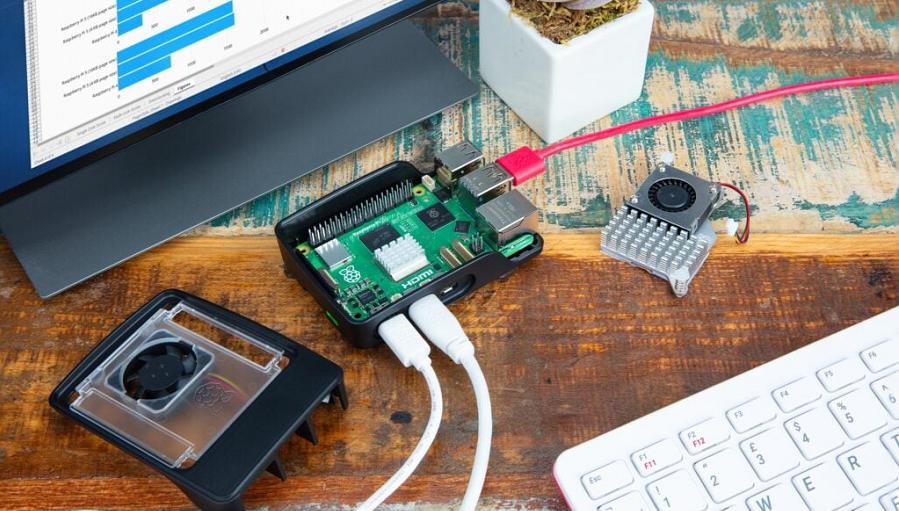 IOT
IOT
 IOT
IOT
 IOT
IOT
Shares of Raspberry Pi Holdings plc, a developer of miniature computers that power satellites and tomato bullhorns, jumped more than 37% in the company’s stock market debut today.
The listing took place on the London Stock Exchange. Cambridge-based Raspberry Pi earlier raised £166 million, or $228 million, through an initial public offering. Investors bought 30.7% of the company’s ordinary shares in the IPO and have the option to purchase an additional 2.3% under an over-allotment provision.
Raspberry Pi makes single-board computers, compact computers that are about the size of a credit card and are implemented on a single circuit board. The company’s newest and most advanced computer, the Raspberry Pi 5, starts at $60. It ships with a custom Linux-based operating system called Raspberry OS that allows users to run simple programs on their devices.
Most of the Raspberry Pi 5’s computing power comes from a quad-core central processing unit supplied by Broadcom Inc. The chip’s four cores, which are based on Arm Holdings plc blueprints, run at a 2.4GHz clock frequency and each have two megabytes of cache along with an equally-sized shared cache. They also include optimizations that make it possible to perform cybersecurity tasks such as encrypting data faster than would otherwise be possible.
A computer’s CPU is usually implemented in the same package as the chip it uses to manage I/O operations, or data input and output tasks. The Raspberry Pi 5 takes a different approach. It implements I/O functions in a separate chip, dubbed the RP1, that Raspberry Pi’s engineers developed in-house based on a legacy 40-nanometer manufacturing node.
The device’s disaggregated architecture, which is known as a southbridge design, was one widely used in personal computers but has since been largely replaced with other chip configurations. Raspberry Pi says that the decision to separate the CPU and I/O modules is designed to ease the development of future products. The Raspberry Pi 5’s disaggregated design will allow the company to upgrade the CPU, which is made using a 16-nanometer process, to newer manufacturing nodes without having to reimplement the I/O chip.
Raspberry Pi launched in 2012 with an initial focus on selling its devices to schools, which use them to teach programming, and hobbyists. In the company’s 2023 fiscal year, those two segments accounted for only 28% of its revenue. The rest came from the industrial and embedded-computing market.
In industrial environments, Raspberry Pi’s computers are used for tasks such as powering connected manufacturing equipment. The devices also lend themselves to analyzing data from production line sensors, monitoring crops and a range of other use cases. Some Raspberry Pi have been sent to space in CubeSats, compact satellites that usually weigh less than two pounds and are mainly used to carry out scientific experiments in low Earth orbit.
The company sells several versions of its miniature computer that are specifically optimized for enterprise use cases. Some of those devices use less power than the original. Others include additional features such as an execute-in-place mechanism, which allows them to run software from an attached flash drive without loading the program into the onboard RAM first.
Raspberry Pi disclosed ahead of its stock market debut today that it has sold more than 60 million miniature computers to date. During its 2023 fiscal year, the company generated a $66 million gross profit on $266 million in revenue. Raspberry Pi estimates that it has a $21 billion total addressable market across the educational, enthusiast, industrial and embedded computing segments.
Support our mission to keep content open and free by engaging with theCUBE community. Join theCUBE’s Alumni Trust Network, where technology leaders connect, share intelligence and create opportunities.
Founded by tech visionaries John Furrier and Dave Vellante, SiliconANGLE Media has built a dynamic ecosystem of industry-leading digital media brands that reach 15+ million elite tech professionals. Our new proprietary theCUBE AI Video Cloud is breaking ground in audience interaction, leveraging theCUBEai.com neural network to help technology companies make data-driven decisions and stay at the forefront of industry conversations.